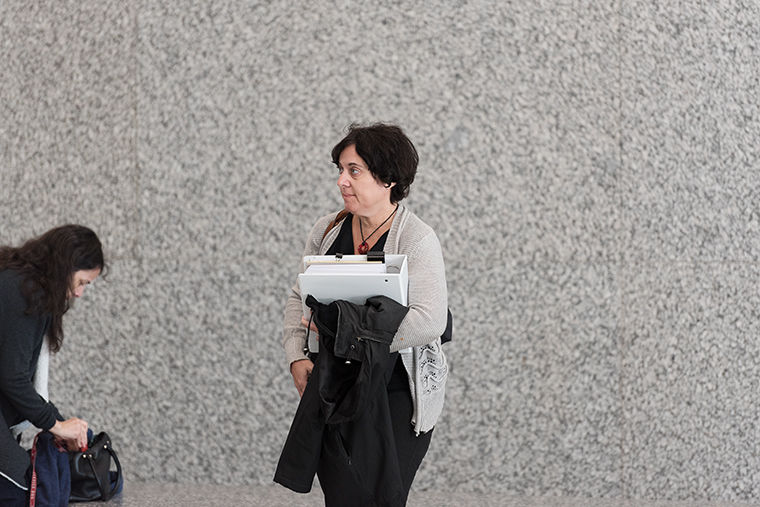P-Fac members, more college witnesses take stand in NLRB hearing
Part-time faculty union President Diana Vallera enters the Everett McKinley Dirksen United States Courthouse, 219 S. Dearborn St., May 18 for an ongoing National Labor Relations Board hearing regarding full-time staff members’ eligibility to teach courses and have union representation.
June 6, 2016
Following the testimony of full-time staff, members of the college’s part-time faculty union, P-Fac, and other college employees were called as witnesses in a National Labor Relations Board hearing regarding the right of full-time staff members to teach part time and have P-Fac representation.
The hearing, which has been held at Everett McKinley Dirksen United States Courthouse, 219 S. Dearborn St. almost every day since May 18, arises from a dispute over the implementation of P-fac’s contract with the school.
P-Fac President Diana Vallera—who took the stand June 3—said she found out in 2013 that college employees outside the bargaining unit were teaching courses. Instructors assigned courses included full-time staff, graduate students and administrators, Vallera said.
Vallera, who along with the union has worked to change course assignments originally given to full-time staff members to give the available courses to P-Fac members, referred to it as “work leakage.”
Elizabeth Reynolds, the attorney representing United Staff of Columbia College union and the approximately 55 full-time staff members who also teach, questioned Vallera’s use of the term “leakage” because some courses have only been taught by staff members and not part-time faculty.
“Those courses taught by full-time staff before the inception of P-Fac never leaked out of the unit because they were never performed by unit members to begin with, right?” Reynolds said.
Vallera also said she has always thought of the distribution of classes outside of P-Fac as a violation of union contract, especially after the 2013 contract was implemented.
“At the time [of bargaining], I was upset because our work was being given away, and I wasn’t sure why these people were allowed to teach…we negotiated to make sure none of these people would be teaching,” Vallera said.
Called by the college’s legal counsel, associate professor in the Theatre Department and coordinator of the costume program Frances Maggio explained that she still assigns classes to full-time staff members in the department. She said she has never been approached by adjunct faculty wanting to teach costume-making courses and noted the staff workers’ built-in knowledge of Columbia is very convenient.
“It’s nice they know [our costume] shop and how things work in the department,” Maggio said. “It’s pretty seamless for the students.”
In addition to Vallera, an adjunct professor in the Cinema Art + Science Department Dale Chapman testified about his experience with full-time staff who teach.
Chapman said he faced issues when he asked why Jill Sultz, a full-time staff member in the College Advising Center who previously testified in the hearing, received summer film foundation courses in 2014 and 2015 instead of him, adding it was the “exact same scenario each year.”
“I inquired about it [within the department],” Chapman said. “I got what I felt wasn’t a straight answer: ‘There’s one assignment, Jill’s got it. If you don’t like it, take it up with P-Fac.’”
When asked by Michael Persoon, P-Fac’s attorney at Despres, Schwartz & Geoghegan, Ltd., whether full-time staff should be in the union, Chapman said no, citing the two groups’ different interests when it comes to conflicts with the college.
He added that he also does not know other P-Fac members that want full-time staff in the part-time union.
“My concern would be conflict of interest issues. This isn’t happening in a vacuum. We’ve been in conflict with the administration for years… [at the meeting for P-Fac’s vote of no confidence during the Fall 2015 Semester] there was no dissent. It wasn’t ‘should we do this,’ it was ‘how quickly can we do this?’”
Nic Ruley, a former adjunct professor in the Television Department who works as negotiations chair for P-Fac and was a departmental representative for the past year, said during the hearing that a unanimous vote during a general membership meeting showed that the union did not want full-time staff in its contract.
After Reynolds questioned whether decisions about staff inclusion were up to general P-Fac members to decide, Ruley said it was his role as an elected department representative to support what the adjuncts want.
Ruley said, as a representative, he received complaints throughout the year from members about the Television Department not following the union’s tier system that allows for long-serving adjuncts to receive classes first. He added that his personal feelings about whether full-time staff should join the union or not is irrelevant because these employees are not included in its contract.
“[P-Fac members] were not getting jobs while people who were not in the contract were getting [classes],” Ruley said. “It was not a personal vendetta. It was not, ‘we hate staff people.’ It was about honoring the contract and saving our jobs.”
Testimony will continue the week of June 6 until completion.








